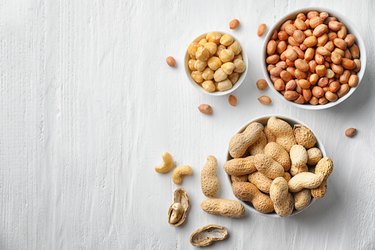
Peanuts and weight loss go together like peas in a pod. A well-rounded weight loss program can include regular servings of peanuts and peanut butter (in moderation). Even better, both forms of this legume offer good nutritional benefits.
Healthy Weight Loss Basics
Video of the Day
When it comes to losing weight, the time-tested "calories in vs. calories out" equation still holds true today. In other words, burning more calories than you consume sets the stage for successful weight loss.
Video of the Day
Regardless of your eating plan, ensure that the nutritionally complete program includes foods from every major food group.
Next, consider whether the plan includes foods you'll actually eat, along with your all-time favorite foods that you'll gladly consume in small amounts. Assuming the answer is "yes" on both counts, determine if your community grocery store regularly stocks them.
Also, ask yourself whether this proposed eating plan meshes with your budget and lifestyle. Simply put, if you're rarely home because of business and personal commitments, it's not realistic to choose an eating plan that requires extensive food prep every day. Finally, confirm that the plan emphasizes regular physical exercise along with healthy eating habits.
Satiating Power of Nuts
To get the best long-term weight loss results, choose foods that leave you feeling sated (or full) after you consume them. Believe it or not, peanuts (and other nuts) have been associated with these feelings of satiety, making peanuts and weight loss a promising pairing. Nutritionally speaking, nuts have generous amounts of protein, fiber and fat; and all these nutrients are likely to make you feel full.
And, if you nosh on nuts instead of animal fats such as bacon and cheese, you're less likely to pack on the pounds. With that said, however, an unrealistic weight-loss program based on a single food (like nuts) won't magically deliver the results you want and will lack other essential nutrients your body needs.
Let's say you've made the peanuts and weight loss connection, and your healthy eating plan includes regular servings of peanuts and/or other nuts. Your teeth can't completely crunch the nuts into an easily digestible form, and your digestive system can't process 100 percent of the food material that makes its way through the digestive tract.
So, your body doesn't release all of the nuts' protein and fat for nutrient absorption, but instead excretes some of those calories as waste products.
Read more: Are Peanuts Healthy for Your Heart?
Three Disadvantages of Peanuts
Despite their nutritional value and versatility, there are several well-known disadvantages of peanuts. If you enjoy snacking on salted peanuts, or peanut butter with added salt, you're also getting a good dose of sodium, which can raise some patients' blood pressure readings. If you're under treatment for blood pressure issues, switch to crunchy unsalted peanuts. You'll get the same nutritional value without the sodium spike.
Peanuts can also be contaminated with aflatoxins, or fungi-produced metabolites found on animal feeds and certain foods. Aflatoxins have been linked to diseases like aflatoxicosis, which affects humans, domestic animals and livestock. Aflatoxin contamination depends on variables such as local agricultural conditions and the peanuts' tendency for fungal intrusion during the harvest cycle.
One of the most serious disadvantages of peanuts is an allergic reaction to peanuts, peanut butter or other peanut products. Consuming even tiny amounts of peanuts can produce harmful effects that include life-threatening anaphylaxis. Naturally, avoiding peanuts and peanut-containing products makes sense. Always read food labels on prepared and processed foods to ensure that peanuts aren't lurking in the ingredients list.
Can Almonds Make You Fat?
Almonds are a super-versatile food that you can enjoy in many forms. Whether you enjoy crunching on plain or salt-dusted almonds, or you prefer a specially flavored variety, these nutritious nuts have something for every taste. Pricey almond butter is an option for people who have a peanut allergy. Non-dairy almond milk is available for lactose-intolerant diners. Almond flour offers a gluten-free alternative for bakers who must stay away from white flour.
Although almonds (and other nuts) are a nutritional powerhouse, nut consumption hasn't been associated with weight gain. In a November 2017 study published in the Journal of the American College of Cardiology, researchers determined that calorie-dense nuts have actually been linked to lower weight gain and a decreased obesity risk. They hypothesized that this result stems from the fact that nuts' fiber and fat content promotes sensations of fullness and satiety,
Read more: What 100 Calories of Almonds Looks Like
Dried Fruits and Weight Gain
Tasty, nutritious fruit plays an important role in a healthy eating plan. Fruit-based nutrients include vitamin C, potassium and dietary fiber. The U.S. Office of Disease Prevention and Health Promotion's 2015-2020 Dietary Guidelines state that a 2,000-calorie-per-day diet should include 2 cups of fruit. Half (or more) of that amount should be comprised of whole fruits.
If you decide to add dried fruit to the menu, know that noshing on these delicious little morsels can pile up the calories. First, consider that one-half cup of dried fruit equals 1 cup of whole fruit.
If dried fruit's smaller portion size entices you to eat an entire cupful, realize that you've just doubled your fruit calorie intake. In addition, dried fruits often contain added sugar that can further spike your daily calorie consumption and make it tougher to lose those unwanted pounds.
- Mayo Clinic: “Weight Loss”
- Tufts University: “Can the Body Digest Nuts Completely?”
- The University of Maine: “Sodium Content of Your Food”
- Cornell University: “Aflatoxins: Occurrence and Health Risks”
- Food Allergy Research & Education: “Peanut Allergy”
- Michigan State University: “Almond Milk”
- Journal of the American College of Cardiology: “Nut Consumption and Risk of Cardiovascular Disease”
- Office of Disease Prevention and Health Promotion: “A Closer Look Inside Healthy Eating Patterns”
- Harvard Medical School: "Is Peanut Butter Healthy? Yes, Says the Harvard Heart Letter"
- Pennsylvania State University: "Nuts About Nuts"